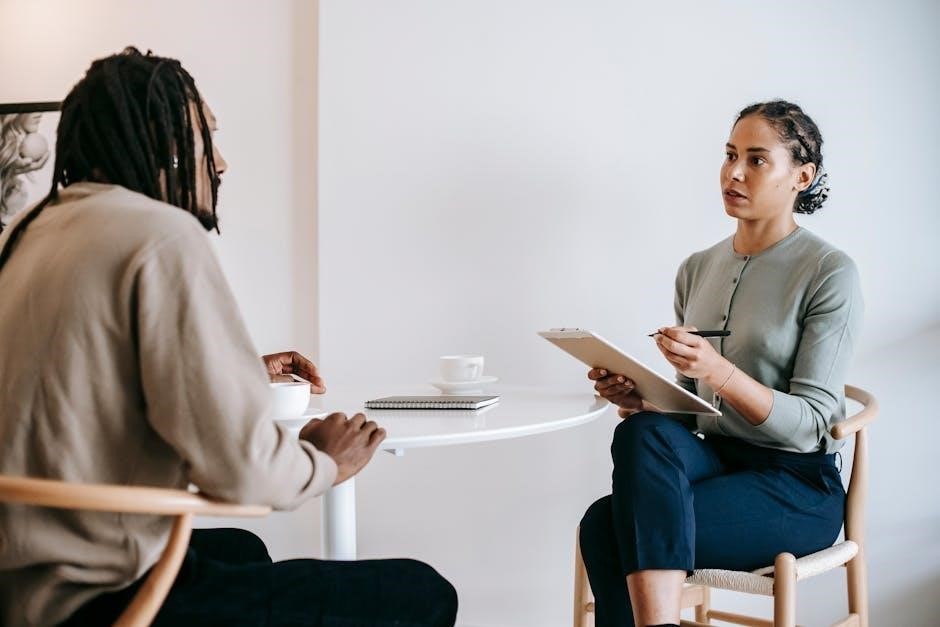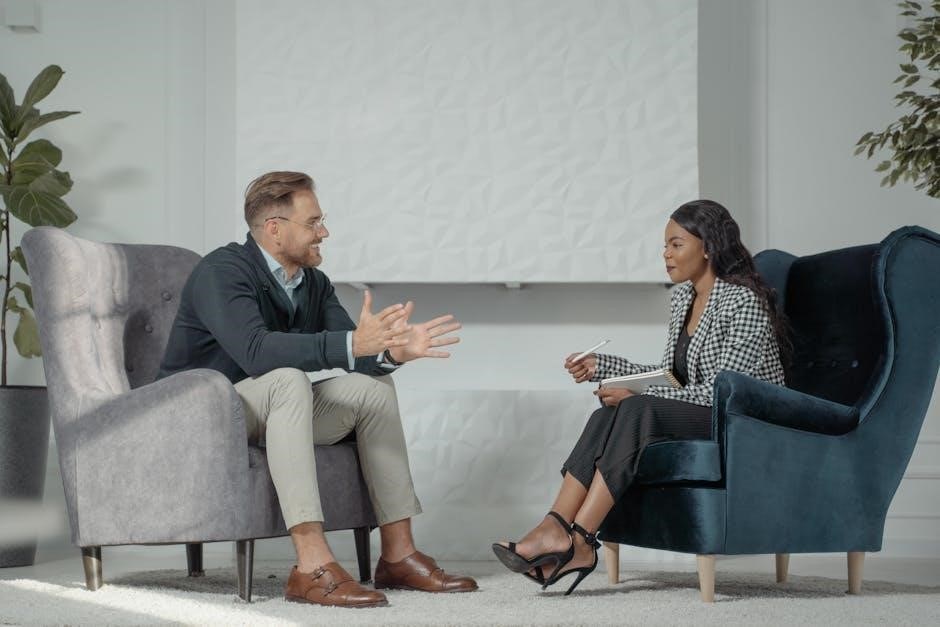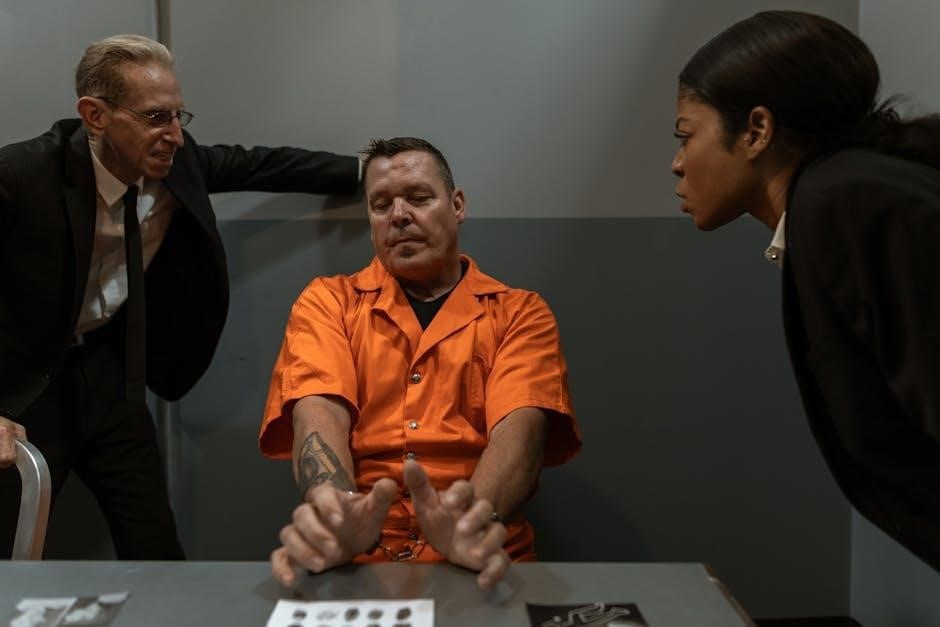visa interview questions for f1 with answers pdf
Understanding F-1 visa interview questions is crucial for international students seeking to study in the U․S․ This guide provides insights into common queries and tips to navigate the process confidently‚ ensuring a smooth experience․

Common F-1 Visa Interview Questions
Preparing for an F-1 visa interview involves understanding common questions about academic goals‚ financial plans‚ and post-study intentions․ This guide covers frequently asked queries to help applicants prepare effectively․
2․1․ Why Do You Want to Study in the United States?
This question assesses your motivation for choosing the U․S․ as your study destination․ Emphasize the country’s academic excellence‚ diverse opportunities‚ and global recognition․ Highlight specific programs or resources that align with your career goals․ Be clear about how studying in the U․S․ will benefit your future․ Avoid vague answers; instead‚ provide specific examples‚ such as renowned faculty‚ cutting-edge research facilities‚ or unique internship opportunities․ Demonstrating a genuine understanding of the institution’s strengths and how they match your aspirations will leave a positive impression․ Additionally‚ discuss how the cultural diversity and vibrant academic environment in the U․S․ will enhance your personal and professional growth‚ making your choice well-justified and thoughtful․
2․2․ Why Have You Chosen This Specific University?
This question evaluates your research and understanding of the institution․ Highlight specific academic programs‚ faculty expertise‚ or research opportunities that align with your goals․ Discuss the university’s reputation‚ curriculum structure‚ and resources relevant to your field․ Mention any unique features‚ such as internships‚ labs‚ or cultural experiences‚ that drew you to this school․ Emphasize how the university’s environment will help you achieve your academic and professional objectives․ Be specific about what makes this university a better fit for you compared to others․ Show that you have a genuine interest in the institution and a clear vision of how it will contribute to your growth․ This demonstrates thoughtful planning and a serious commitment to your education․
2․3․ What Are Your Plans After Completing Your Studies?
Be prepared to clearly articulate your post-study plans‚ as this demonstrates your commitment and intent․ Emphasize your desire to return to your home country to apply the knowledge and skills gained in the U․S․ Share specific career goals‚ such as working in a particular industry or role‚ or pursuing further education․ Highlight how your studies align with the needs of your home country or employer․ If applicable‚ mention plans to contribute to your field through research‚ innovation‚ or entrepreneurship․ Avoid vague statements and ensure your plans are realistic and well-thought-out․ This question helps verify your genuine intentions and ties to your home country‚ which are critical for a successful visa application․
2․4․ How Will You Finance Your Education and Living Expenses?
Be prepared to provide detailed information about your financial resources․ Clearly explain how you will cover tuition‚ living expenses‚ and other costs during your stay in the U․S․ Mention any scholarships‚ grants‚ or financial aid you have received․ If you are self-funding‚ provide bank statements or proof of funds to demonstrate your ability to cover expenses․ If sponsored by family or friends‚ include their financial documents and sponsorship letters․ Highlight any additional sources of income‚ such as part-time jobs or assistantships․ Emphasize that you have sufficient funds to support yourself without relying on unauthorized employment․ This question assesses your financial stability and ensures you can maintain yourself legally in the U․S․ Be precise and avoid vague statements to build credibility․
2․5․ Do You Have Any Relatives in the United States?
This question helps the visa officer assess your ties to your home country․ Be honest and provide clear details about any relatives living in the U․S․‚ including their relationship to you (e․g․‚ parents‚ siblings‚ cousins)․ If you have relatives‚ explain how you maintain connections with them and how they support your decision to study abroad․ If you don’t have relatives‚ emphasize your strong ties to your home country‚ such as family‚ job opportunities‚ or property․ Avoid vague or evasive answers‚ as this may raise concerns about your intent to return home after completing your studies․ Ensure your response aligns with the information provided in your DS-160 form․ This question is crucial for demonstrating your genuine intent to return home after completing your education in the U․S․
2․6․ What Are Your Academic Background and Test Scores?
The visa officer may ask about your academic background and test scores to assess your eligibility for the program and your ability to succeed in a U․S․ university․ Be prepared to discuss your previous academic achievements‚ such as your GPA‚ degrees earned‚ and relevant coursework․ Highlight any honors or distinctions you’ve received․ For test scores‚ specify the exams you’ve taken (e․g․‚ GRE‚ GMAT‚ TOEFL‚ or IELTS) and provide the exact scores․ Explain how your academic history aligns with the program you’re applying to and demonstrates your readiness for the challenges ahead․ If you have low scores in certain areas‚ address them by mentioning how you’ve improved or how your strengths in other areas compensate․ This question is an opportunity to showcase your academic strength and commitment to your field of study․
2․7․ How Will You Adapt to Cultural and Educational Differences?
The visa officer may ask this question to assess your ability to thrive in a new cultural and academic environment․ Be prepared to discuss how you will adapt to cultural differences‚ such as holidays‚ social norms‚ and communication styles in the U․S․ Highlight your openness to learning about American culture and your willingness to engage with diverse communities․ For educational differences‚ explain how you will adjust to the U․S․ academic system‚ which often emphasizes critical thinking‚ class participation‚ and independent learning․ Mention any experiences you’ve had with cultural diversity‚ such as studying or working with international teams‚ and how these experiences have prepared you․ Additionally‚ outline any steps you plan to take‚ such as researching cultural norms or joining international student groups‚ to ease your transition․ Show confidence in your ability to adapt and grow in this new environment․
2․8․ What Are Your Career Goals?
When asked about your career goals‚ the visa officer is assessing your intentions and how your studies align with your future aspirations․ Be clear and specific about your short-term and long-term objectives․ Explain how the program you’ve chosen will equip you with the skills and knowledge needed to achieve these goals․ For example‚ if you plan to work in a specific industry‚ describe how the coursework and practical experiences will prepare you; If you aim to pursue further studies or start your own business‚ highlight relevant aspects of your program․ Emphasize your commitment to returning to your home country or contributing to your field globally‚ aligning with your program’s outcomes․ Avoid vague statements; instead‚ demonstrate a well-thought-out vision for your future‚ showing how your education in the U․S․ is a critical step in achieving your career aspirations․
2․9․ Have You Been to the United States Before?
Be honest and clear when discussing your previous visits to the U․S․ If you have been there before‚ provide details such as the purpose of your visit‚ the duration of your stay‚ and whether you complied with the terms of your previous visa․ Mentioning specific experiences‚ like visiting family or attending a conference‚ can help build credibility․ If you have not been to the U․S․‚ explain why you are interested in studying there now․ This question helps the visa officer understand your familiarity with the country and assess your intentions․ Avoid withholding information‚ as it could raise concerns about your credibility․ Whether you’ve visited before or not‚ the goal is to demonstrate your commitment to returning home after completing your studies․ Keep your response concise and focused on relevant details․
2․10․ How Many Universities Did You Apply To?
Be prepared to discuss how many universities you applied to and why you chose those specific institutions․ This question helps the visa officer understand your decision-making process and commitment to studying in the U․S․ If you applied to multiple universities‚ explain how each aligns with your academic and career goals․ Highlight the unique features of the university you plan to attend‚ such as its program offerings‚ faculty expertise‚ or research opportunities․ Avoid giving the impression that you applied randomly; instead‚ show that you carefully selected each university based on its strengths and relevance to your field․ If you only applied to one university‚ justify your choice confidently‚ emphasizing its suitability for your aspirations․ This question also assesses your seriousness and focus‚ so ensure your answer is clear and logical․

Preparation Tips for the F-1 Visa Interview
Research the university and program thoroughly‚ practice mock interviews‚ and organize all required documents․ Stay updated on visa policies and be ready to discuss your financial plan and career goals․
3․1․ Research the University and Program
Thoroughly researching the university and program is essential for a successful F-1 visa interview․ Understanding the institution’s reputation‚ academic offerings‚ and campus resources demonstrates genuine interest and preparation․ Visit the official website to learn about the program’s curriculum‚ faculty expertise‚ and unique opportunities like internships or research․ Familiarize yourself with the university’s location‚ cultural environment‚ and support services for international students․ This knowledge will help you confidently answer questions about why you chose the specific program and how it aligns with your academic and career goals․ Additionally‚ being aware of the university’s ranking and specializations can highlight your motivation and seriousness about studying in the U․S․ This preparation not only impresses the visa officer but also ensures you make an informed decision about your education․
3․2․ Practice Mock Interviews
Practicing mock interviews is a proven way to build confidence and improve performance․ Use common F-1 visa interview questions to simulate real scenarios․ This helps in organizing thoughts‚ refining answers‚ and reducing nervousness․ Record sessions to review body language‚ tone‚ and clarity‚ ensuring a professional demeanor․ Seek feedback from mentors or peers․ Mock interviews also help in addressing potential weaknesses and refining responses to complex questions․ Consistent practice ensures readiness for any unexpected queries‚ making the actual interview feel more manageable․ This preparation is key to presenting a polished and genuine image to the visa officer․ Regular practice fosters a natural‚ confident delivery of answers‚ increasing the likelihood of a positive outcome․
3․3․ Organize Required Documents
Organizing required documents is essential for a smooth F-1 visa interview․ Ensure all paperwork is neatly arranged and easily accessible․ This includes the I-20 form‚ acceptance letter‚ passport‚ visa appointment confirmation‚ financial documents like bank statements and scholarship letters‚ and academic records such as transcripts and test scores․ Additionally‚ prepare evidence of ties to your home country‚ such as property deeds or family documents․ Having a checklist ensures nothing is missed․ Review each document to verify accuracy and completeness․ Presenting organized documents demonstrates responsibility and seriousness‚ making a positive impression on the visa officer․ Be prepared to explain any gaps or discrepancies in your records․ Proper organization saves time and avoids delays during the interview process․ It also shows your readiness to comply with visa requirements and your commitment to your studies in the U․S․
3․4․ Be Ready to Discuss Your Financial Plan
Being prepared to discuss your financial plan is vital for the F-1 visa interview․ Ensure you can clearly explain how you will cover tuition‚ living expenses‚ and other costs during your studies․ Bring documents like bank statements‚ scholarship letters‚ and the I-20 form‚ which outlines your financial resources․ Be prepared to explain the sources of your funding‚ such as personal savings‚ family support‚ or sponsors․ If you have a scholarship‚ highlight the details and how it contributes to your financial stability․ Visa officers want to confirm that you can afford living in the U․S․ without relying on unauthorized employment․ Practice articulating your financial plan concisely and confidently‚ ensuring transparency and honesty․ This demonstrates your responsibility and readiness to manage your expenses while studying abroad․
3․5․ Understand Visa Policies and Procedures
Understanding U․S․ visa policies and procedures is essential for a smooth F-1 visa interview․ Familiarize yourself with the F-1 visa requirements‚ such as maintaining full-time student status‚ not working off-campus without authorization‚ and adhering to the terms of your I-20 form․ Research the role of SEVIS (Student and Exchange Visitor Information System) and how it tracks your academic and immigration status․ Review the visa application process‚ including the DS-160 form‚ SEVIS fee payment‚ and appointment scheduling․ Be aware of the 30-day entry window before your program start date․ Knowing these details demonstrates your responsibility and preparedness․ Additionally‚ understand the importance of ties to your home country‚ as visa officers assess your intent to return after completing studies․ Being informed about these policies helps you address questions confidently and avoid misunderstandings during the interview․

Common Mistakes to Avoid During the Interview
Avoid inconsistent or vague answers‚ lack of preparation‚ and misunderstanding visa policies․ Ensure clarity on financial plans‚ program details‚ and ties to your home country to build credibility․
4․1․ Inconsistent or Vague Answers
One of the most critical mistakes during an F-1 visa interview is providing inconsistent or vague answers․ Visa officers are trained to identify discrepancies in responses‚ which can raise concerns about the applicant’s credibility․ For instance‚ if asked about academic plans or financial support‚ vague statements like “I’ll figure it out later” or “I’m not sure” can lead to rejection․ It’s essential to provide clear‚ concise‚ and well-prepared answers that align with the information in your application․ Inconsistent responses‚ such as contradicting your DS-160 form or failing to recall your university details‚ can also harm your case․ To avoid this‚ thoroughly research your program‚ practice answering potential questions‚ and ensure your financial documents and academic records are organized․ Clarity and honesty are key to building trust with the visa officer and demonstrating your genuine intentions for studying in the U․S․
4․2․ Lack of Preparation
Lack of preparation is a significant oversight that can negatively impact an F-1 visa interview․ Visa officers expect applicants to be well-informed about their chosen university‚ program details‚ and future goals․ Failing to research the institution or understand the curriculum can signal a lack of seriousness․ Additionally‚ not organizing required documents‚ such as financial statements‚ admission letters‚ or test scores‚ can delay the process or lead to rejection․ Practicing responses to common questions and understanding the visa policies beforehand is crucial․ Applicants who appear disorganized or uninformed may raise concerns about their commitment to studying in the U․S․ Proper preparation demonstrates responsibility and genuine intent‚ increasing the likelihood of a successful outcome․ It’s essential to review all materials and anticipate potential questions to avoid last-minute confusion or errors․
4․3․ Not Understanding the Visa Process
Not understanding the visa process can lead to misunderstandings and mistakes during the interview․ Many applicants fail to recognize the importance of aligning their responses with the visa officer’s expectations․ The F-1 visa process is designed to ensure that applicants intend to study in the U․S․ temporarily and maintain their student status․ Without a clear understanding of the process‚ applicants may provide inconsistent or irrelevant information‚ raising red flags․ For instance‚ not knowing the difference between F-1 and other visa types or misunderstanding the requirements for maintaining status can lead to confusion․ Additionally‚ applicants who are unaware of the visa officer’s focus on ties to their home country may fail to emphasize their intent to return after completing studies․ Researching the visa process thoroughly ensures that applicants can present their case effectively and address the officer’s concerns confidently․

The Importance of the Visa Interview
The visa interview is a critical step in assessing eligibility and intentions․ It allows officers to evaluate an applicant’s background‚ goals‚ and understanding of the visa process‚ ensuring compliance with regulations․
5․1․ Understanding the Visa Officer’s Perspective
Understanding the visa officer’s perspective is key to a successful interview․ Officers assess eligibility‚ genuine intent‚ and compliance with visa policies․ They aim to ensure applicants will abide by the terms of their visa and return home after completing their studies․ Officers may question ties to the home country‚ financial stability‚ and academic qualifications․ They seek consistent‚ clear answers to determine the applicant’s credibility․ Demonstrating a well-planned future‚ including post-study intentions‚ strengthens the case․ Officers also look for evidence of preparation and honesty‚ avoiding vague or misleading responses․ By aligning answers with the officer’s priorities‚ applicants can effectively address concerns and showcase their genuine intentions․ Preparation and honesty are vital to aligning with the officer’s perspective and achieving a favorable outcome․
5․2․ Demonstrating Ties to Your Home Country
Demonstrating strong ties to your home country is essential during the F-1 visa interview․ Visa officers want to ensure that applicants intend to return home after completing their studies․ Ties can include family‚ employment opportunities‚ property‚ or ongoing commitments in your home country․ Highlighting these connections shows that you have a strong reason to return․ For example‚ explaining your family responsibilities or future job prospects can strengthen your case․ Additionally‚ owning property or having a business in your home country can serve as evidence of your intent to return․ Be specific and sincere when discussing these ties‚ as vague statements may raise concerns․ Demonstrating clear and genuine connections to your home country helps alleviate doubts about your intentions and aligns with the visa officer’s expectations for a successful application․
5․3․ Showcasing Your Genuine Intentions
Showcasing genuine intentions is a critical aspect of the F-1 visa interview․ Visa officers aim to assess whether you truly intend to pursue education in the U․S․ and not overstay your visa․ Be prepared to clearly articulate your academic and career goals‚ as well as how studying in the U․S․ aligns with your future plans․ Avoid vague statements and provide specific details about your program‚ university‚ and post-study intentions․ Honesty and clarity are key․ Demonstrate that you have a well-thought-out plan for your time in the U․S․ and that you intend to return home after completing your studies․ Highlighting your commitment to your home country’s development can also strengthen your case․ Being genuine and organized in your responses will help convey your sincerity and increase your chances of a successful interview․ This is your opportunity to prove your intentions align with visa policies․
The F-1 visa interview is a pivotal step in your journey to study in the United States․ Preparing thoroughly for common questions‚ organizing essential documents‚ and understanding visa policies are key to a successful outcome․ Demonstrating genuine intentions‚ clear academic goals‚ and strong ties to your home country will help build confidence with the visa officer․ Avoiding mistakes like inconsistent answers or lack of preparation is equally important․ By researching‚ practicing‚ and staying informed‚ you can approach the interview with confidence․ Remember‚ this is your opportunity to showcase your commitment to your education and future aspirations․ A well-prepared interview not only reflects your readiness for the challenges ahead but also highlights your sincere intent to abide by visa regulations and contribute positively to your academic and professional growth․ Stay focused‚ organized‚ and authentic‚ and you will navigate the process effectively․